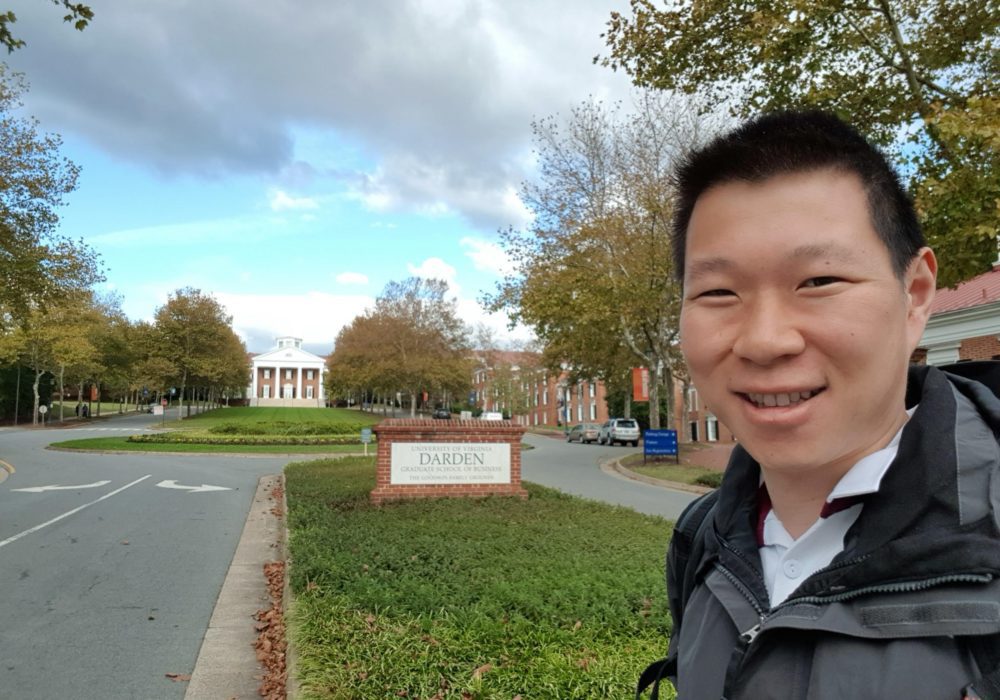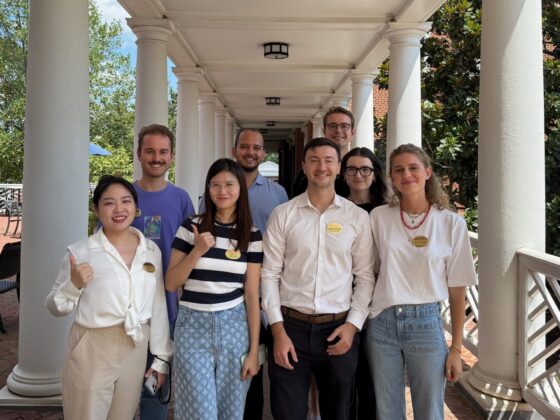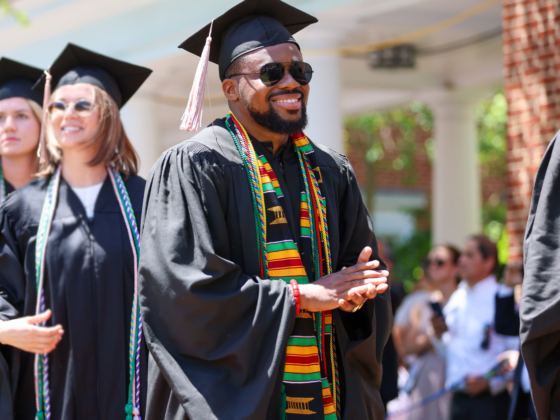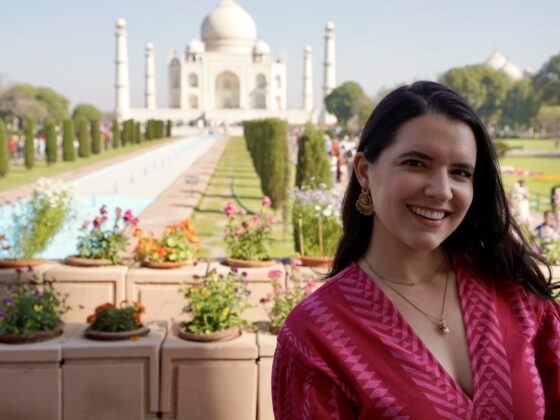Darren Lau studied at Darden as an exchange student from Melbourne Business School (MBS) in Australia in Fall 2019. Darren’s Darden experience inspired him to create My MBA Taught Me, a podcast highlighting lessons learned from MBA schools around the world. Darren shared more about the inception of his idea for the podcast as well as his Darden experience in a recent interview:
Please tell us a bit about yourself and your background.

As a first generation Australian born to parents from Hong Kong and China who hadn’t gone to university, I came from humble beginnings, working at their takeaway restaurant after school and building an aversion for manual labor from an early age. I studied hard through public middle and high school and successfully enrolled into the University of Melbourne, where I studied commerce and majored in accounting and finance. I fell into my first job after university working for KPMG, but after four years of working there, I realized it wasn’t the best fit for me. I moved to London and pivoted into a contract role at the Royal Bank of Scotland, but again found that this job wasn’t “it”. I wanted a job that would be career-defining for me; up until this point, I felt like I had been going where the wind blew me and I knew I needed to take a more proactive approach.
I decided to write down a list of companies I would like to work for and applied for jobs on their websites, one of which was a contracted finance position at the Walt Disney Company. This approach proved successful, and I enjoyed the role with Disney so much that I planned to change my visa status and take up a permanent position in London. But, in July 2015, I received a call that would send me back to Melbourne to help take care of my father after his sudden liver cancer diagnosis. Back in Melbourne, I kept working with the London Disney office, but later transitioned into a full time permanent role at the Melbourne Disney office, where I still work (albeit remotely) today. I decided to begin my part-time MBA degree at Melbourne Business School in 2017 to challenge myself and keep my mind sharp. I finished my degree earlier this year, and I’m ready for the next career-defining move I make, wherever and whenever that may be.
How did you hear of Darden? What made you decide to study abroad here on exchange?
I heard about Darden through a Darden student David Yoken (MBA ’19), who came to Australia on exchange and studied at MBS. At the time, I served as the admissions and exchange liaison on the MBS student council, whose responsibilities included welcoming incoming exchange students. I got to know David and Kate Seelig (MBA ’19), another Darden exchange student, really well as they both went beyond the surface-level expectation of meeting and getting to know people. I took the chance to pick David’s brain about Darden over dinner and drinks, as I was planning to go on exchange myself.
At the end of the day, going to Darden felt “meant to be”. Everyone has a certain preconceived notion of what it will be like to go to a U.S. school on exchange, but my experience was so different and I can only express how you have to be at Darden to fully understand and appreciate it.
How was your academic experience at Darden similar to or different from MBS?

The socialization experience is different at Darden compared to MBS. At MBS, the majority of MBA students are part-time students that already live in Melbourne, with full-time jobs, families and other commitments that take up the majority of their time. At Darden, there is a plethora of opportunities to socialize with everyone at a much deeper level. Just within the two months that I spent at Darden, I made deep connections with Darden students and fellow exchange students – our exchange cohort still catches up regularly because of the great bonds we made while at Darden.
In addition to the social aspect, I could sense the high level of commitment that Darden faculty have to their profession and to their students. The faculty engagement at MBS felt more transactional, which likely stems from the difference in the degree program being part-time, but this contrasted so differently from Darden’s faculty engagement.
What was most interesting or what surprised you most about your time here at Darden?
Darden has so many opportunities to be introspective and vulnerable, and I loved that people were so willing to open up about difficult topics and that Darden created safe spaces to have those conversations. Darden enabled me to form great relationships with fellow students and faculty in the classroom, even in times where there were such polarizing views and passionate advocates. Seeing the tension, conflict and diversity of thought from students from throughout the U.S. and world come together in the classroom only enriched my learning experience, especially as an Australian who hadn’t given much thought into U.S. culture and how that might play out in the classroom before my exchange experience.
Darden students’ hospitality also surprised me – people wanted to catch up for coffee or invite me to social events, and someone even invited me to their family Christmas party in Arizona! I wouldn’t have expected or even welcomed that level of hospitality previously, but while at Darden I didn’t want to miss an opportunity to experience something new.
How did your time at Darden influence your perspective on global business?
One lesson that I learned from my Darden experience is not to make assumptions about the American psyche or stereotype. Darden definitely opened up my eyes to the reality that not everyone has certain political views or a love for the NBA or NFL. Empathy is required to understand, at the individual level, people’s motives and their hearts. Practicing empathy makes you a better global businessperson because you are willing to understand your global clients, partners, and colleagues on an individual level. To do global business effectively, you need to know someone who has lived and breathed in that place. Because of my global experiences prior to and at Darden, I now know people who could prevent some potential headaches doing business around the globe.
You recently started a podcast to explore the uniqueness of MBA programs around the world. Tell us more – what inspired you to start this podcast?
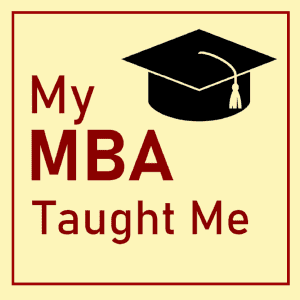
My MBA Taught Me has been my pet project during the coronavirus pandemic. I had the idea for the podcast at Darden while having many lengthy discussions with my fellow exchange students about the differences in our MBA experiences and business schools, and how the MBA is not as highly valued in our home countries as it is in the States. Aside from various MBA rankings frequently published, there is a lack of resources comparing business schools to each other.
The podcast aims to have representatives from different MBA schools in a range of countries, speaking about their unique MBA experiences and what doing business is like in their country. The podcast has four episodes so far, including one featuring David Yoken (MBA ’19). The podcast is available on Apple Podcasts, Spotify and Google Podcasts, as well as its own website, MyMBATaughtMe.com. If it becomes successful, I could envision it as a community of global MBAs who can bounce ideas off one another, brainstorm together, and answer specific questions like, “How should I do business in blank [fill in the country]?”
What are some lessons you learned at Darden that you will continue to apply in your future career?
I knew that the exchange program would be a concentrated experience of Darden, so I wanted to hit the ground running and pack as much into it as I possibly could. I cannot rave enough about my two-month experience at Darden and the lessons I learned there.
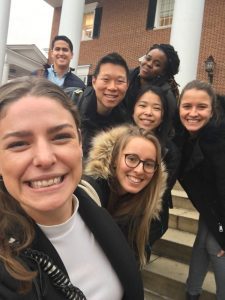
In terms of academics, I will always value the Ambicultural Strategy course I took taught by Professor Ming-Jer Chen. I learned that cultures are dynamic and that the culture of an organization will continue to evolve whether you influence it or not. Ambiculturalism is also the ideology of no singular dominant culture but, rather, the best aspects of numerous subcultures combined together, so there are parts of the overall culture that appeal to different minority groups. I have already started applying lessons of ambiculturalism into my current workplace, ensuring that I bring my unique perspectives to the table and that I amplify voices that often go unheard. I will also carry this lesson forward into my future careers by opening my mind to consider diverse perspectives and to keep diversity and inclusion at the forefront of my efforts.
A broad-brush lesson I took from my experience at Darden is the importance of having support. Support from friends, peers and colleagues provides that extra confidence and motivation needed to brainstorm ideas, pursue dreams and get the job done. The supportive culture at Darden is so infectious that people feel like they can move mountains. For me, it only took brainstorming with one person – Nefé Etomi, a fellow exchange student from my cohort at Darden – to bring my idea for the My MBA Taught Me podcast to life. After a single conversation with Nefé and a night of sleep, I rolled my sleeves up, built the website, created the social media accounts and started to make the podcast become a reality. Nefé is positive, inspiring and the most recently featured guest on the podcast. I also want to thank Professor Tami Kim and her digital marketing course for giving me the confidence to build the website for My MBA Taught Me!

